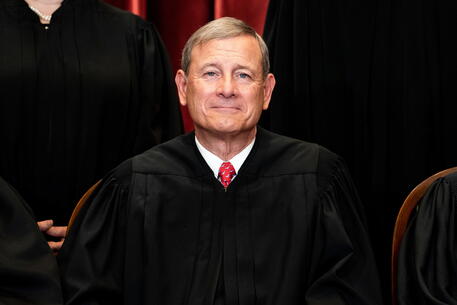The White House and the judiciary are now in open conflict. With Congress firmly under Donald Trump’s control, the system of institutional checks and balances has left it up to the courts to challenge White House decisions that appear illegitimate. In the past few hours, two federal judges have blocked two key measures of the Trump administration, ruling them unconstitutional.
Judge Ana Reyes, in Washington, D.C., issued a preliminary injunction against the ban on military service for transgender individuals, stating that the policy had no valid military justification and was motivated by bias.
In Maryland, Judge Theodore Chuang halted the dismantling of USAID ordered by Elon Musk, ruling that the move violated the Constitution. He ordered the immediate restoration of access to the agency’s systems and suspended its closure.
But what has caused the biggest stir is Chief Justice of the Supreme Court John Roberts, who took the rare step of issuing a statement rejecting the request made by the president and his allies (including Elon Musk) on Truth Social: they had called for the prosecution or impeachment of all judges who obstruct the president’s political agenda.
“For more than two centuries, it has been established that impeachment is not an appropriate response to disagreement concerning a judicial decision. The normal appellate review process exists for that purpose,” Roberts wrote.
The Supreme Court now has a conservative majority (thanks to the three justices appointed by Trump during his first term). Roberts, who has led the Court since 2005, is a moderate conservative and was nominated by then-President George W. Bush.
Let’s start with the USAID case. USAID is—or was—the U.S. federal agency responsible for distributing American aid worldwide, and the largest international aid organization. Elon Musk’s Department of Government Efficiency (DOGE) effectively gutted it, firing nearly all the employees, suspending programs worth billions of dollars (over 80% of its activities), and shutting down its historic headquarters in Washington, D.C.
Now, U.S. District Judge Theodore Chuang has ordered Musk and his DOGE to immediately grant USAID employees access to their “email, payment, security notifications, and all other electronic systems,” and has imposed a suspension on any efforts to shut down the agency.
Musk’s takeover, Chuang wrote, “usurped the authority of the public’s elected representatives in Congress to make decisions on whether, when, and how to eliminate a federal government agency, and of Officers of the United States duly appointed under the Constitution to exercise the authority entrusted to them.”
DOGE and Musk must also submit a written agreement within two weeks ensuring that USAID can reoccupy its former headquarters in the Ronald Reagan Building in Washington. The exact implications of this ruling on USAID’s operations remain uncertain.
The Transgender Military Ban: in a second case, U.S. District Judge Ana Reyes blocked the Trump administration’s ban (Executive Order 14183) on transgender military service, issuing a preliminary injunction Tuesday in Talbott v. Trump. Reyes found that the ban likely violated the constitutional rights of transgender service members, and that the government had failed to provide evidence that it served a legitimate military purpose. In fact, she stated, the White House’s policy was soaked in animus and dripping with pretext.” “The ban at bottom invokes derogatory language to target a vulnerable group in violation of the Fifth Amendment”.
The case was brought by GLAD Law and the National Center for Lesbian Rights on behalf of 20 transgender individuals who are serving or were preparing to serve in the armed forces. In a 79-page opinion, Reyes stated that the order was not only likely unconstitutional, but also “a solution in search of a problem.”
Every judicial setback against the White House’s policies—designed to implement the ultraconservative Project 2025, the plan drafted in 2022 by the Heritage Foundation to reshape the United States—will face further legal challenges from the Trump administration’s legal teams.
This is why Chief Justice John Roberts’ statement is crucial: it signals a conflict between the executive and judicial branches escalating all the way to the Supreme Court.
Roberts spoke out after Trump called for the removal of U.S. District Judge James E. Boasberg for attempting to block his plans to deport 250 individuals accused of gang involvement to El Salvador (Trump justified the move by invoking wartime powers from an 18th-century law). Writing on social media, Trump described Boasberg as a “radical left lunatic” and an unelected “troublemaker and agitator.”












